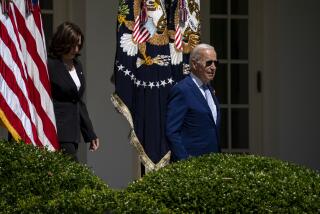Carter in Syria, to Ask Help to Free Hostages
- Share via
CAIRO — Former President Jimmy Carter, brushing aside a testy White House reaction to his criticism of President Reagan’s Middle East policies, flew to Damascus on Saturday to seek Syrian help in freeing eight Americans held hostage in Lebanon.
Arriving in the Syrian capital from Cairo, Carter indicated that he will raise the question of the hostages when he meets today with Syrian President Hafez Assad.
He said he will ask the Syrians to use their influence in Lebanon to help gain the release of 24 foreign hostages, including the eight Americans, believed held by pro-Iranian terrorists.
While stressing that he is visiting Syria in a private capacity and “not as a representative of the United States government,” Carter said he would ask Assad to do whatever he can to secure the release of the hostages. The former president told reporters in Cairo last week that he expects to meet in Damascus with “some people . . . who might have new information” about the hostages.
Syria has maintained troops in Lebanon for a decade, and last month sent more than 7,000 Syrian troops into Beirut to curb the fighting between rival Muslim militias.
Before he and his wife, Rosalynn, left Egypt, Carter reiterated his criticism of what he said is the Reagan Administration’s lack of interest in the Middle East, which he had earlier cited as one of the main reasons for the absence of any progress in the peace process since Reagan assumed office.
His criticism, during a speech Thursday to American businessmen in Cairo, drew a sharp retort from White House spokesman Marlin Fitzwater, who said, “If he (Carter) wants to be helpful in the area of foreign affairs, he might want to forgo criticism of U.S. leaders while he’s on foreign soil.”
Denies Neglect Charge
Fitzwater also denied that the Reagan Administration has neglected Middle East peace efforts, although he conceded that there have been no “breakthroughs” comparable to the Camp David negotiations and the Egyptian-Israeli peace treaty mediated by Carter while he was in office.
Asked about Fitzwater’s response, Carter told reporters before leaving Cairo for Damascus that he was “not surprised” by the White House reaction.
“I am not here to criticize any particular administration, . . . but I think the evidence is very convincing that during my time in office and that of Presidents (Gerald R.) Ford and (Richard M.) Nixon, there was a constant and unswerving commitment to the peace process in the Middle East,” Carter said.
That commitment, he added, has “been missing in the last six years.”
Sensitive Time
Carter’s criticism of Reagan’s Middle East policies comes at a sensitive time for the White House, which is trying to overcome the considerable damage to its credibility caused by the revelations of the Iran- contras scandal.
Perhaps nowhere has the U.S. image been more tarnished in this respect than in the Arab world. Even before news of the Iran affair broke, officials in Egypt, Jordan and other moderate Arab countries friendly to the United States have been complaining in increasingly bitter terms about what they regard as the Reagan Administration’s ignorance of, and lack of interest in, the peace process and other complicated but crucial regional issues.
President Reagan, in his news conference Thursday, sought to minimize these differences, maintaining that Washington’s relationship with moderate Arab states is “better than we’ve had in many decades.”
Difference of Opinion
However, that assessment of U.S.-Arab relations is radically different from the one prevailing in the Arab world, judging from recent comments, both public and private, made by Egyptian, Jordanian and other officials, including U.S. diplomats stationed in the Middle East.
Both Jordan’s King Hussein and Egypt’s President Hosni Mubarak have warned that U.S. credibility in the Arab world is at a low point and both leaders are said by aides to be extremely disappointed by what they see as the low priority attached by the Reagan Administration to Middle East peace efforts.
“Basically, America’s friends in the region have given up on the Reagan Administration,” a senior Egyptian official said.
Gets Warm Reception
While public criticism by U.S. allies in the region has been more diplomatic, the warm, high-level reception accorded Carter in Egypt and Syria underscores this frustration with the Reagan Administration, officials said.
Although he is touring the region as a private citizen--and has stressed that he is not here as an emissary of the Reagan Administration--Carter was received with honors in Cairo, where he met Mubarak and other senior officials. While in Cairo, he visited the city’s Coptic cathedral and met with Pope Shenouda III, spiritual leader of Egypt’s Christian Copts.
More to Read
Sign up for Essential California
The most important California stories and recommendations in your inbox every morning.
You may occasionally receive promotional content from the Los Angeles Times.













